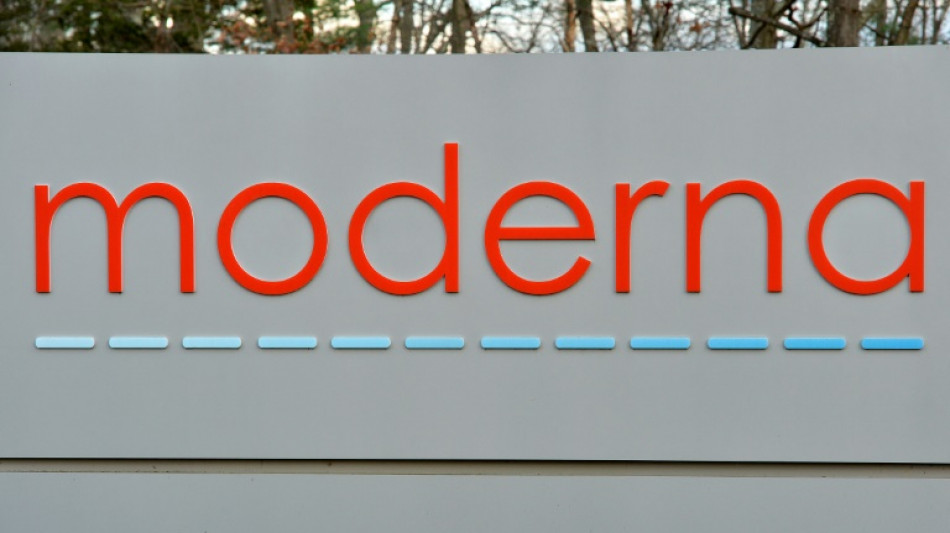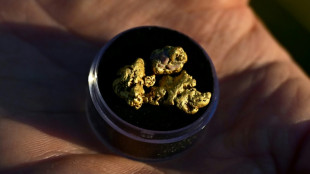
-
 US Navy veterans battle PTSD with psychedelics
US Navy veterans battle PTSD with psychedelics
-
'Unheard of': Dodgers in awe of iron man Yamamoto

-
 UK police probe mass train stabbing that wounded 10
UK police probe mass train stabbing that wounded 10
-
'It's hard' - Jays manager Schneider rues missed chances in World Series defeat

-
 Women's cricket set for new champion as India, South Africa clash
Women's cricket set for new champion as India, South Africa clash
-
Messi scores but Miami lose as Nashville level MLS Cup playoff series

-
 Dodgers clinch back-to-back World Series as Blue Jays downed in thriller
Dodgers clinch back-to-back World Series as Blue Jays downed in thriller
-
Vietnam flood death toll rises to 35: disaster agency

-
 History-making Japan golf twins push each other to greater heights
History-making Japan golf twins push each other to greater heights
-
Death becomes a growing business in ageing, lonely South Korea

-
 India's cloud seeding trials 'costly spectacle'
India's cloud seeding trials 'costly spectacle'
-
Chiba wins women's title, Malinin leads at Skate Canada

-
 Siakam sparks injury-hit Pacers to season's first NBA win
Siakam sparks injury-hit Pacers to season's first NBA win
-
Denmark's fabled restaurant noma sells products to amateur cooks

-
 UK train stabbing wounds 10, two suspects arrested
UK train stabbing wounds 10, two suspects arrested
-
Nashville top Messi's Miami 2-1 to level MLS Cup playoff series

-
 Fergie, her daughters and the corgis hit by Andrew crisis
Fergie, her daughters and the corgis hit by Andrew crisis
-
'I can't eat': Millions risk losing food aid during US shutdown

-
 High price of gold inspires new rush in California
High price of gold inspires new rush in California
-
'Swing for the fences': Carney promises bold budget as US threat grows

-
 UK police arrest two after 'multiple people' stabbed on train
UK police arrest two after 'multiple people' stabbed on train
-
NBA Hawks lose guard Young for four weeks with knee sprain

-
 50 dead as Caribbean digs out from Hurricane Melissa
50 dead as Caribbean digs out from Hurricane Melissa
-
Forever Young gives Japan first Breeders' Cup Classic triumph

-
 Mbappe's Real Madrid extend Liga lead, Villarreal move second
Mbappe's Real Madrid extend Liga lead, Villarreal move second
-
Salah savours 'great feeling' after 250th Liverpool goal

-
 Ethical Diamond surges to upset win in $5 million Breeders' Cup Turf
Ethical Diamond surges to upset win in $5 million Breeders' Cup Turf
-
Kinghorn kicks Toulouse to Top 14 summit

-
 Mbappe extends Real Madrid's Liga lead in Valencia rout
Mbappe extends Real Madrid's Liga lead in Valencia rout
-
All Blacks sink 14-man Ireland 26-13 in Chicago Test

-
 World champ Malinin takes lead at Skate Canada
World champ Malinin takes lead at Skate Canada
-
Liverpool snap losing streak as Salah hits 250 goals in Villa win

-
 Salah's 250th Liverpool goal sinks Villa as Arsenal cruise at Burnley
Salah's 250th Liverpool goal sinks Villa as Arsenal cruise at Burnley
-
Morant suspended by Grizzlies after rebuking coaching staff

-
 Spalletti begins Juve tenure with win at Cremonese but Napoli held
Spalletti begins Juve tenure with win at Cremonese but Napoli held
-
Frank refuses to condemn Van de Ven, Spence for snub in Spurs defeat

-
 France superstar Dupont extends Toulouse deal
France superstar Dupont extends Toulouse deal
-
Egypt officially opens grand museum near pyramids

-
 French fraud watchdog reports Shein for 'childlike' sex dolls
French fraud watchdog reports Shein for 'childlike' sex dolls
-
Scotland thrash USA before All Blacks' clash

-
 Five things to know about the Grand Egyptian Museum
Five things to know about the Grand Egyptian Museum
-
Bayern rest stars but ease past Leverkusen before PSG clash

-
 Dead quiet: Paris Catacombs close for renovations
Dead quiet: Paris Catacombs close for renovations
-
Families separated, children killed as survivors flee Sudan's 'apocalyptic' El-Fasher

-
 Napoli held by Como as Spalletti begins Juve adventure
Napoli held by Como as Spalletti begins Juve adventure
-
Southampton boss Still vows to fight on as pressure mounts

-
 Borthwick hails 'ball of energy' Pollock as England down Australia
Borthwick hails 'ball of energy' Pollock as England down Australia
-
Egypt opens grand museum in lavish, pharaonic ceremony

-
 Joao Pedro strikes at last as Chelsea edge past Spurs
Joao Pedro strikes at last as Chelsea edge past Spurs
-
Ohtani to open for Dodgers in World Series deciding game seven


Moderna mRNA mpox vaccine shows promise in animal study
An experimental Moderna mRNA vaccine for mpox has demonstrated greater effectiveness than current shots in reducing disease symptoms and duration, according to an animal study published in the journal Cell on Wednesday.
It comes amid an outbreak of the disease in Africa -- partly driven by a new variant that emerged in the Democratic Republic of Congo -- which has been declared an international emergency.
Senior author and virologist Jay Hooper from the US Army Medical Research Institute for Infectious Diseases told AFP that researchers were interested in exploring mRNA technology to find a "sweet spot" -- an mpox vaccine that is both highly safe and highly effective.
Vaccines for mpox, previously known as monkeypox, were originally developed to combat smallpox, which has since been eradicated.
The currently licensed JYNNEOS vaccine uses a "live attenuated" virus, meaning the virus has been weakened so it cannot cause disease in humans.
That attenuation also limits its protective efficacy compared to the older ACAM2000 vaccine -- which was however potentially infectious.
In contrast, the mRNA vaccine includes genetic instructions that train the host's immune system to recognize four key viral antigens, which are crucial for the virus to attach to cells.
Moderna uses the same mRNA technology in its highly safe and effective coronavirus vaccine.
In the study, six macaques were vaccinated with the mRNA vaccine, and another six received an equivalent of the currently licensed vaccine.
Eight weeks after their initial dose, all 12 vaccinated macaques were exposed to a lethal strain of mpox. A third group of six unvaccinated macaques was also exposed to the virus.
Researchers monitored the health of the animals over a four-week period, taking blood samples to assess their immune responses.
As anticipated, all vaccinated animals survived, regardless of the vaccine type, while five out of the six unvaccinated animals died.
"But if we focus specifically on the outcomes with the mRNA vaccine, what we saw was quite surprising and exciting," co-senior author Galit Alter, a virologist and immunologist at Moderna, told AFP.
Animals that received the mRNA vaccine experienced less weight loss and developed significantly fewer lesions compared to those given the live attenuated vaccine.
On average, the control group developed up to 1,448 lesions, the group vaccinated with the older vaccine had a maximum of 607 lesions, and the mRNA-vaccinated group had only 54 lesions at most.
Moreover, the mRNA vaccine shortened the period during which the animals exhibited lesions by more than 10 days compared to the MVA vaccine. It also resulted in lower viral loads in both blood and throat swabs, suggesting it could be more effective in reducing transmission.
First author Alec Freyn of Moderna told AFP that serum from the mRNA-vaccinated macaques was also tested against other viruses in the Orthopox family, and it effectively neutralized vaccinia, cowpox, rabbitpox, camelpox, and ectromelia virus.
The vaccine candidate, named mRNA-1769, is now being tested in an early-stage human clinical trial in the UK to assess its safety and immune response.
S.Leonhard--VB




